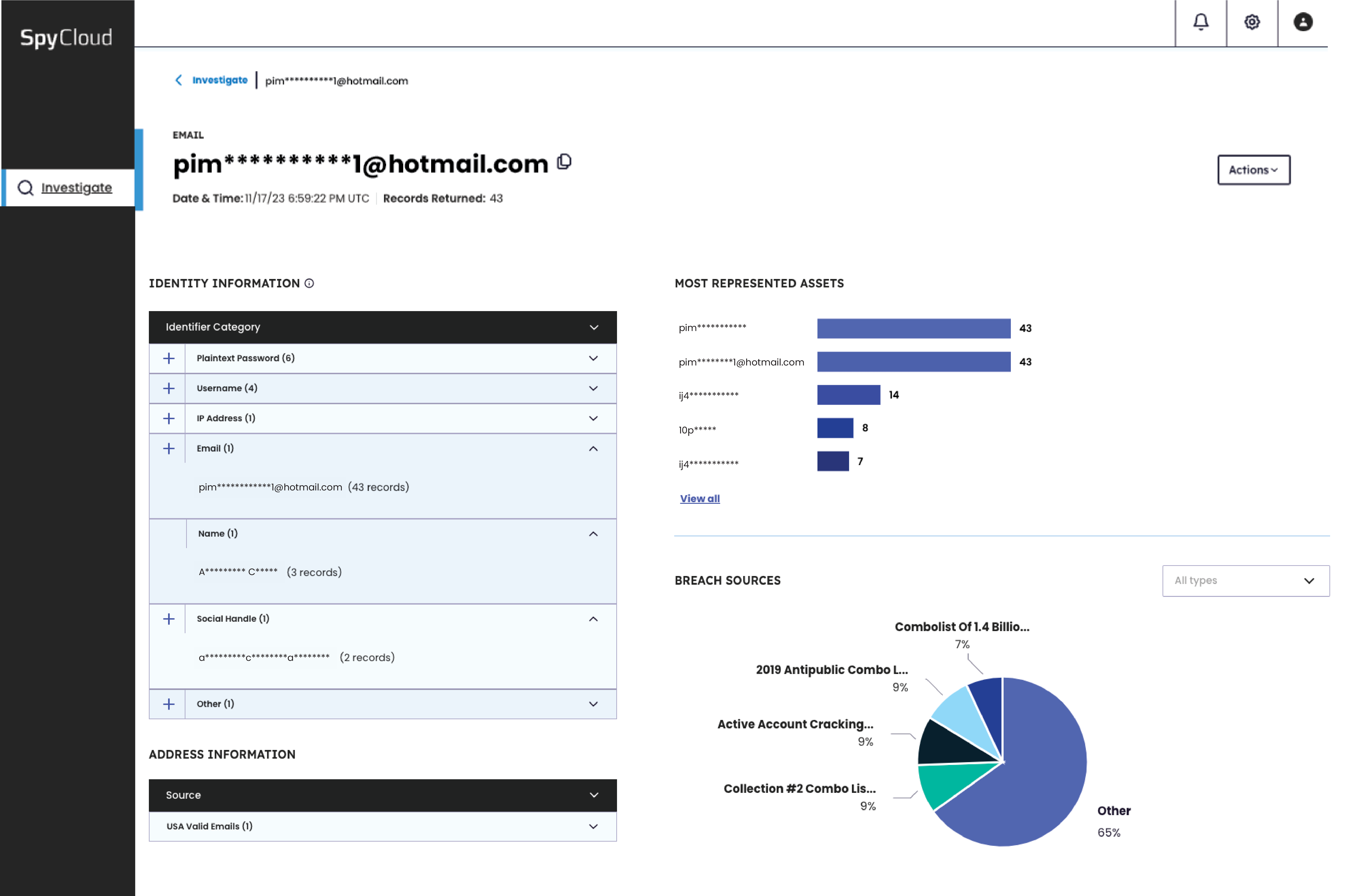Photo Gallery
 |
SpyCloud

Additional Info
| Company size | 100 - 499 employees |
| World Region | North America |
| Website | spycloud.com |
NOMINATION HIGHLIGHTS
With cybercrime rising, one of the most widespread security gaps facing organizations is the exposed user authentication data on the darkweb. Traditional security defenses and incident response plans offer an incomplete view of the threat landscape, not accounting for malware-exfiltrated data or compromised devices outside the standard corporate purview. As the leader in operationalizing Cybercrime Analytics, SpyCloud is disrupting the criminal underground and helping businesses fortify cyber defenses by improving visibility into the full extent of dark web exposure on corporate systems. Using its unmatched repository of 560+ billion (and growing) recaptured assets, SpyCloud delivers actionable insights that allow enterprises to protect against identity-based cyber-attacks such as ransomware, session hijacking, fraud and account takeover. Over 550 of the world’s leading companies – including half of the Fortune 10 – use SpyCloud’s solutions to detect when cybercriminals have employee and customer assets, and secure over 4 billion employee and consumer accounts. One of its latest solutions, Compass, offers a holistic look into risks associated with malware attacks, including the exfiltrated data most likely to lead to ransomware attacks. Compass enables complete remediation of all malware-infected devices, even if they fall outside corporate oversight, through a series of steps inserted into existing incident response approaches. This SpyCloud-pioneered approach is called post-infection remediation (PIR). SpyCloud’s wide range of protection and detection techniques is unsurpassed in its ability to aid enterprises with any cybercrime problem through its various solutions. Security teams can reset compromised passwords automatically with Active Directory Guardian, protect against network breaches due to password reuse with Enterprise ATO Prevention, empower high-risk executives to monitor personal accounts for stolen passwords with VIP Guardian, and gain visibility into third-party exposures needing remediation with Third Party Insight. SpyCloud also recently launched a SaaS-based Investigations Portal to expedite investigations into cyber and financial crimes.
How we are different
Unique and Robust Data: SpyCloud leverages a unique blend of human intelligence and darknet analysis to ensure the largest global repository of breach data, comprising over 560+ billion recaptured assets from the darknet. This collection facilitates innovative and proactive security strategies, like post-infection remediation, long before other enterprises are aware of the data compromise.
Holistic Remediation: SpyCloud helps security teams mitigate the long-term risk of malware by going beyond traditional incident response and standard device remediation to address otherwise unseen compromised assets. With post-infection remediation, security teams are given the information necessary to prevent threats and the ability to intervene on corporate and unmonitored personal devices, significantly shortening the window of vulnerability for enterprise exposure. This approach also bolsters ransomware defenses, as organizations close their security gaps and lower the attack surface by remediating the entry points used by criminals and negating the value of stolen data. SpyCloud stands out as the sole company offering support for PIR.
Actionable Industry Insights: SpyCloud's team of experts routinely analyzes its robust dataset of recaptured assets and provides industry leaders with actionable insights into cybercrime trends via comprehensive reports, including its annual Identity Exposure Report, Fortune 1000 Identity Exposure Report, Ransomware Defense Report and new Malware Readiness & Defense Report. SpyCloud's focused cybercrime research group, SpyCloud Labs, also uncovers and analyzes intricate patterns from the criminal underground to proactively disrupt cybercrime. These insights include findings gained from reverse-engineering emerging malware families that infect business systems and open the doors to follow-on attacks like ransomware.

Vote by Sharing
- Like
- Digg
- Tumblr
- VKontakte
- Buffer
- Love This
- Odnoklassniki
- Meneame
- Blogger
- Amazon
- Yahoo Mail
- Gmail
- AOL
- Newsvine
- HackerNews
- Evernote
- MySpace
- Mail.ru
- Viadeo
- Line
- Comments
- SMS
- Viber
- Telegram
- Subscribe
- Facebook Messenger
- Kakao
- LiveJournal
- Yammer
- Edgar
- Fintel
- Mix
- Instapaper
- Copy Link
Each completed social share counts as a vote for this award nomination.



